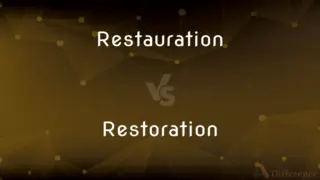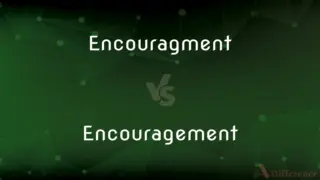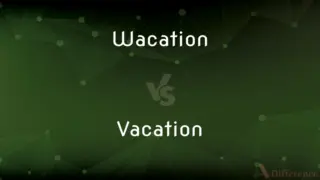Weild vs. Wield — Which is Correct Spelling?
By Tayyaba Rehman — Updated on March 24, 2024
"Weild" is an incorrect spelling, while "Wield" is the correct spelling, referring to exercising power or control, or holding and using a weapon or tool.

Table of Contents
Which is correct: Weild or Wield
How to spell Wield?

Weild
Incorrect Spelling

Wield
Correct Spelling
ADVERTISEMENT
Key Differences
Think of "wield" as "I can wield it" with the 'i' before 'e'.
Picture a hand wielding or holding an "ie" sign.
Associate it with "shield," which has the same 'ie' arrangement.
Remember, 'i' comes before 'e' just as wielding power comes before seeing results.
Recall "wield a sword" where the sword's blade goes up first like 'i' before the handle 'e'.
ADVERTISEMENT
How Do You Spell Wield Correctly?
Incorrect: She tried to weild influence over the committee.
Correct: She tried to wield influence over the committee.
Incorrect: To weild power effectively requires wisdom.
Correct: To wield power effectively requires wisdom.
Incorrect: He can weild a sword with great skill.
Correct: He can wield a sword with great skill.
Incorrect: The magician can weild magic like no other.
Correct: The magician can wield magic like no other.
Wield Definitions
Wield means to hold and use a weapon or tool.
He wielded the hammer skillfully.
Wield can mean to manage or control something.
Corporations can wield enormous power.
Wield is to utilize something to one's advantage.
Writers wield words to convey emotions.
Wield is a civil parish in Hampshire, England, within the district of East Hampshire. It includes two neighbouring villages, Upper Wield and Lower Wield.
To handle (a weapon or tool, for example) with skill and ease.
To exercise (authority or influence, for example) effectively.
(obsolete) To command, rule over; to possess or own.
(obsolete) To control, to guide or manage.
(obsolete) To carry out, to bring about.
To handle with skill and ease, especially a weapon or tool.
To exercise (authority or influence) effectively.
To govern; to rule; to keep, or have in charge; also, to possess.
When a strong armed man keepeth his house, all things that he wieldeth ben in peace.
Wile [ne will] ye wield gold neither silver ne money in your girdles.
To direct or regulate by influence or authority; to manage; to control; to sway.
The famous orators . . . whose resistless eloquenceWielded at will that fierce democraty.
Her newborn power was wielded from the first by unprincipled and ambitions men.
To use with full command or power, as a thing not too heavy for the holder; to manage; to handle; hence, to use or employ; as, to wield a sword; to wield the scepter.
Base Hungarian wight! wilt thou the spigot wield!
Part wield their arms, part curb the foaming steed.
Nothing but the influence of a civilized power could induce a savage to wield a spade.
Of power or authority
Handle effectively;
The burglar wielded an axe
Wield can refer to exercising power or authority.
She wields influence in the community.
Wield denotes handling something effectively.
He wields his knowledge with confidence.
Wield Meaning in a Sentence
A good leader knows how to wield authority compassionately.
Warriors in ancient times learned to wield swords from a young age.
It's important for diplomats to wield influence wisely in negotiations.
To wield a paintbrush is to hold the power to create new worlds on canvas.
In the game, players can wield various weapons, each with its own strengths.
He learned to wield the power of speech to inspire those around him.
Musicians wield their instruments to evoke deep emotions.
Gardeners wield their tools to cultivate beauty in nature.
To wield a camera is to capture moments that tell impactful stories.
Architects wield the blueprint to transform vision into reality.
Through art, individuals wield the ability to express their deepest emotions and thoughts.
Scientists wield knowledge to push the boundaries of what's possible.
Teachers wield the ability to shape the minds of future generations.
Leaders must learn to wield decision-making powers responsibly.
Activists wield the power of the word to fight for justice and equality.
To wield influence in social media is to have a voice that can reach millions.
Wield Idioms & Phrases
Wield the brush
To use artistic skills to create visual art.
She wields the brush to bring her visions of vibrant landscapes to life.
Wield influence over
To have control or power over someone or something.
The CEO wields considerable influence over the industry's trends.
Wield the mic
To use one's voice effectively in public speaking or singing.
At the concert, the lead singer wielded the mic, captivating the audience.
Wield the hammer
To work with strength and determination, often in construction or craftsmanship.
The carpenter wields the hammer, building homes with care and precision.
Wield a shield
To protect oneself or others, literally or metaphorically.
The advocate wields a shield, defending the rights of the vulnerable.
Wield the keys
To control access or possess the means to unlock something.
As the IT manager, she wields the keys to the company's digital kingdom.
Wield the gavel
To preside over a court or meeting with authority.
The judge wields the gavel with a sense of fair-mindedness and justice.
Wield the baton
To conduct an orchestra or lead a group with authority.
The conductor wields the baton, drawing beautiful music from the orchestra.
Wield the torch
To lead the way or carry on a tradition.
The young athlete wields the torch, representing hope for the future of the sport.
Wield a magic wand
To have or wish for a quick or easy solution to a problem.
Unfortunately, we can't wield a magic wand to fix these issues overnight.
Wield the lens
To use photography to reveal truths or tell stories.
The photojournalist wields the lens to capture moments that speak volumes.
Wield the scalpel
To perform surgery or work with precision and skill in a specialized field.
The surgeon wields the scalpel with confidence, saving lives every day.
Wield the axe
To take decisive action, especially in removing or reducing something.
The new CEO wielded the axe, making significant changes to streamline the company.
Wield the oar
To navigate or steer with effort and direction.
Together, the team wielded the oars, pushing their boat to victory.
Wield the word
To use language and communication to influence or persuade.
The speaker wielded the word, inspiring the audience with his passionate speech.
Wield the whip
To enforce discipline or drive forward with control.
The project manager wielded the whip, keeping the team on a tight schedule.
Common Curiosities
What is the verb form of Wield?
"Wield" itself is a verb.
What is the pronunciation of Wield?
Wield is pronounced as /wi:ld/.
Which preposition is used with Wield?
Common prepositions include "with" (as in "wield with authority").
What is the root word of Wield?
The root word is the Old English "wealdan."
Why is it called Wield?
The term "wield" comes from Old English "wealdan" meaning to control or dominate.
Which vowel is used before Wield?
Typically, the vowel "a" as in "a wield."
What is the plural form of Wield?
As a verb, "wield" doesn't have a plural form.
Is Wield a negative or positive word?
Neutral in itself, but the context can give it a positive or negative connotation.
Is Wield a collective noun?
No, "wield" is a verb.
Is the word Wield imperative?
It can be used in the imperative mood, e.g., "Wield your power wisely!"
What is the singular form of Wield?
"Wield" is already in its singular verb form.
Which conjunction is used with Wield?
Conjunctions aren't specific to verbs. It can be "and," "or," "but," etc., depending on the sentence.
Is Wield an adverb?
No, "wield" is not an adverb.
What is a stressed syllable in Wield?
The entire word "wield" is stressed as it's one syllable.
What is the first form of Wield?
The first form is "wield."
Is Wield a noun or adjective?
"Wield" is primarily a verb.
What part of speech is Wield?
"Wield" is a verb.
Is the Wield term a metaphor?
Not inherently, but it can be used metaphorically, e.g., "wield influence."
Is the word Wield a gerund?
The gerund form is "wielding."
How do we divide Wield into syllables?
Since it's one syllable, it isn't divided: Wield.
What is the opposite of Wield?
"Surrender" or "relinquish" can be opposites in some contexts.
Which determiner is used with Wield?
Determiners like "this," "that," or "each" can be used with the object of "wield" based on context.
What is the third form of Wield?
The third form is "wielded."
Is Wield an abstract noun?
No, it's a verb.
Is Wield a vowel or consonant?
"Wield" is a word composed of both vowels and consonants.
Is Wield a countable noun?
"Wield" is not a noun, it's a verb.
Is the word “Wield” a Direct object or an Indirect object?
"Wield" is a verb, so it can take a direct object (e.g., what is being wielded), but it isn't a direct or indirect object itself.
What is another term for Wield?
"Exert" or "exercise" (as in power or influence) can be synonyms in certain contexts.
What is the second form of Wield?
The second form is "wielded."
How is Wield used in a sentence?
Leaders must wield their authority responsibly.
Which article is used with Wield?
Depending on the context, "a" or "the" can be used, but not directly before "wield" since it's a verb.
How many syllables are in Wield?
One syllable.
Share Your Discovery
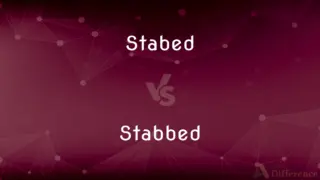
Previous Comparison
Stabed vs. Stabbed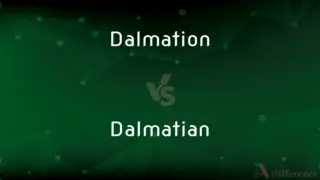
Next Comparison
Dalmation vs. DalmatianAuthor Spotlight
Written by
Tayyaba RehmanTayyaba Rehman is a distinguished writer, currently serving as a primary contributor to askdifference.com. As a researcher in semantics and etymology, Tayyaba's passion for the complexity of languages and their distinctions has found a perfect home on the platform. Tayyaba delves into the intricacies of language, distinguishing between commonly confused words and phrases, thereby providing clarity for readers worldwide.












